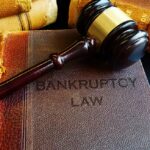Credit card debt that you are unable to pay can have a devastating impact on your financial health. High interest rates and fees can turn a meager balance into a massive debt. If you cannot pay this balance, then you may face legal action and a garnishment of your wages. Chapter 7 Bankruptcy will discharge your unsecured debts entirely without repayment, if you qualify. Chapter 13, which is a re-organization of your finances, will help you to get out from under your crushing credit card debt. Still, bankruptcy is a serious matter which should not be entered into blindly or without critical consideration. Here’s more on how filing for bankruptcy may help you with your credit card debt.
Chapter 7 Bankruptcy
Chapter 7 is perhaps the most popular form of bankruptcy for individuals with extensive credit card debt. It works by liquidating any non-exempt assets and then using the proceeds to pay off priority debt. However, most assets are exempt under state or federal law, meaning you would not have to sell that property in order to pay off debt in the bankruptcy proceeding. The vast majority of people that file for Chapter 7 either have no eligible assets to sell or are able to use an exemption to hold on to their home or vehicle.
Under Chapter 7, debts are prioritized and paid in order of importance with any available liquidated assets. An unpaid credit card balance is usually considered an “unsecured,” low-priority debt. What this means is that it will not get paid unless more important debts are satisfied.
In order to qualify for Chapter 7, you must fall below certain income thresholds (you can’t make more than a certain amount of money according to your household size). If you qualify, your credit card debt will go unpaid and will be fully eliminated in Chapter 7 bankruptcy.
Chapter 13 Bankruptcy
Another option you have when trying to reduce your credit card debt is Chapter 13. This form of bankruptcy works by reorganizing your debt and creating a repayment plan. You must have regular, consistent income to qualify for Chapter 13. Your repayment plan will typically last 3 to 5 years.
With respect to credit card debt, Chapter 13 also typically considers it to be unsecured. This usually has the effect of placing credit card debt last in the order of repayment. Still, depending on your situation, this may result in you only paying a fraction of what was originally owed. Remember, though, that not all credit cards are considered unsecured debt. Cards that were used to purchase jewelry, furniture, or a vehicle may involve secured debt that could be prioritized differently in order of payment.
Additional Considerations
Filing for bankruptcy almost always has the effect of lowering your credit score. Once you file for bankruptcy, you likely will have a difficult time getting new loans or establishing new lines of credit. While both Chapter 7 and Chapter 13 will negatively affect your credit score, Chapter 7 may continue to do so for up to 2.5 years after you file, whereas Chapter 13 will have a lesser impact.
You should closely examine the pros and cons of bankruptcy before you decide to file. Consulting with an experienced bankruptcy attorney before you file can help you to weigh these pros and cons and guide you toward the path that is most appropriate for your individual financial situation.
Colorado Bankruptcy Attorney
Consumer Law Pro has helped thousands of people get a hold of their crippling financial problems. Because of this, we have the experience and skill to understand your situation and help you address it in the most sensible manner. A Consumer Law Pro bankruptcy lawyer will carefully review your situation, help you figure out your options, and work hard to help you overcome your financial burdens. To consult with Consumer Law Pro, call (303) 297-7729 or contact us online today.

